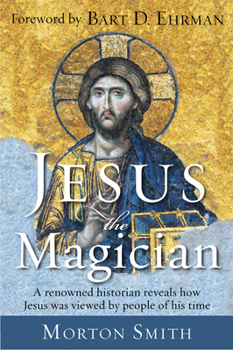Jesus the Magician
Select Format
Select Condition 
Book Overview
"A twentieth-century classic, uncannily smart, incredibly learned."--from the foreword by Bart Ehrman This book challenges traditional Christian teaching about Jesus. While his followers may have seen him as a man from heaven, preaching the good news and working miracles, Smith asserts that the truth about Jesus is more interesting and rather unsettling. The real Jesus, only barely glimpsed because of a campaign of disinformation,...
Format:Paperback
Language:English
ISBN:157174715X
ISBN13:9781571747150
Release Date:August 2014
Publisher:Hampton Roads Publishing Company
Length:320 Pages
Weight:1.00 lbs.
Dimensions:0.7" x 6.0" x 9.0"
Customer Reviews
4 ratings
Provocative, Insightful, and Scholarly
Published by Thriftbooks.com User , 18 years ago
There are almost as many views of the historical Jesus as there are authors of books about the topic. After awhile many of them they tend to blend into one homogeneous view; one that acknowledges that indeed he was a Jew, and a reformer, and a healer, etc. The debate is still out on his Zealot propensities, but apart from that, the field seems so bland. But read this 1978 book by Morton Smith and you will discover a Jesus not dreamt of by Smith's contemporaries, nor by anyone since. Smith goes through the gospels and the ancient texts to demonstrate that underneath everything else, Jesus was primarily a magician. No, not the David Copperfield type, but a true magician whose powers came from his divine spark. Smith's analysis of the ancient evidence is masterful, and his case is very convincing. No matter what your position is on the historical Jesus, you need to read Smith's perspective.
informative book
Published by Thriftbooks.com User , 19 years ago
Whether you agree with him or not, Morton Smith has something to say. In this book you might learn not only about what Jesus contemporaries probably thought of him, but also about the concept of magic and how ancient people understood it. For example, why do magicians sometimes seem to cast a spell by a long and time-consuming procedure while at other times they do it with a single word? Smith answers this question. (Hint: why do computer programmers sometimes write code for hours while at other times they launch a program with one key stroke? Basically the same answer to both quetstions.) My only major criticism of this book is that Smith never answers the question "what, if any, difference is there between religion and magic?" Even though he must have an answer to this, he never makes it clear.
Jesus according to Nero
Published by Thriftbooks.com User , 23 years ago
For centuries The Secret Gospel of Mark has been a pink elephant in studies of reconstructing the gospel. Without the plethora of strong denials of this document's existence, there would be no reason to suppose it exists, but with these denials one could be led to a "the lady doth protest too much" conclusion. In the 1960's Morton Smith discovered a letter from Saint Clement of Alexandria to one of his followers, regarding the Secret Gospel of Mark. In this letter he corrects certain comments the follower had heard but instructs him not to reveal the existence of this document. What's interesting about these few passages we have from the longer version of Mark is that all of them revolve around quasi-magical practices. In other words was Mark part of a longer work, and the magical material censored out? Since Morton Smith was unlikely to trip over gold again and find more of this lost book, he begins investigating the nature of magical practice in 1st century Palestine using texts like the magical papyri. What did people mean by magic? From this study we are able to understand much more clearly what verses like, Matt 9:34, "It is by the prince of demons that he drives out demons ", meant to the speaker which as it turns out is quite different than what they mean to a modern audience. A very good book, I wouldn't recommend it as a first "true life of Jesus" but it makes an excellent contrast to the Crossen, E.P. Sanders school which tries to place Jesus in a fully Jewish context by ignoring everything that doesn't fit.
maverick scholarship with flawless methodology
Published by Thriftbooks.com User , 24 years ago
Morton Smith, the author of this book, died while I was pursuing coursework in earliest Christianity at Brown University, so I saw firsthand the effect of his passing on (a set of) his peers, most of whom, it turns out, are believers. Although Smith's views are frightening and sometimes even repugnant to the faithful, his work commands a real (and not always grudging) respect among Christian scholars. Smith's method is heavily comparative, analyzing the four Gospel accounts of the life of Jesus in terms of choice of language and expositional technique, and comparing them to contemporaneous rabbinical and Hellenic writing. Granting a very few premises - such as, that Jesus and his followers did not conceive of themselves as representative of a wholly new historical paradigm, but rather as a part of their own cultural context, a premise quite consistent with the decisions they made in describing themselves and Jesus - the resulting historical account is virtually unassailable, and powerfully compelling. The most controversial aspect of Smith's results is the theory that Jesus thought of himself as a "magician", in the sense that that word was used 2000 years ago in the Levant, in addition to - but very much overlapping with - his roles as a religious teacher and political revolutionary. In conclusion, I can say with confidence that this is one of those books of history which come along only once in a very great while - Guns, Germs, and Steel; Plagues and Peoples; Bandits, Prophets, and Messiahs - which leave the reader unshakeably certain that this is how it *must* have been.





